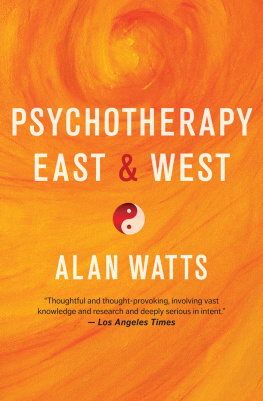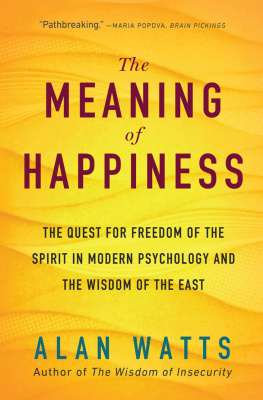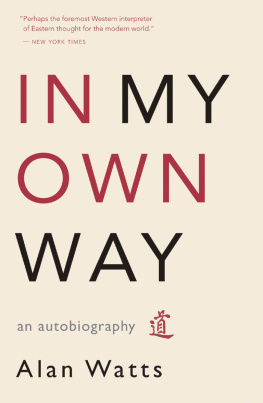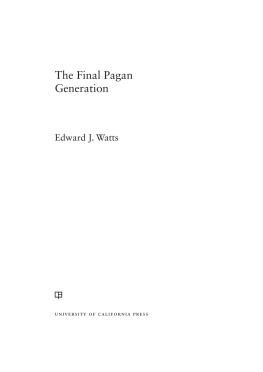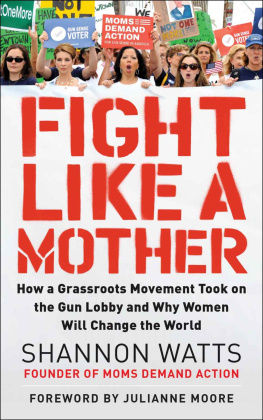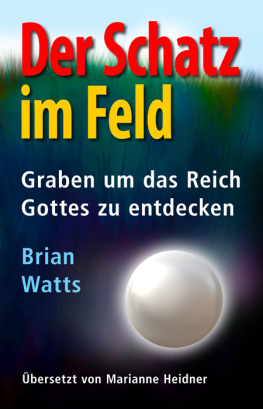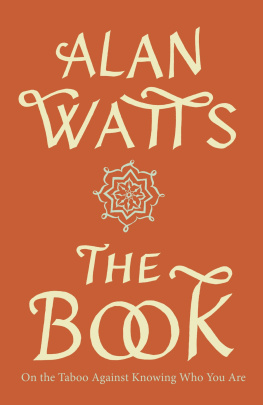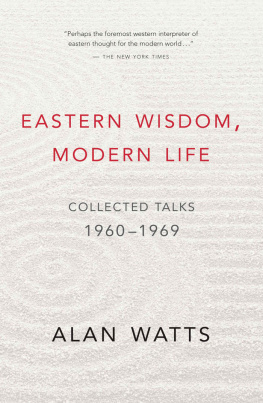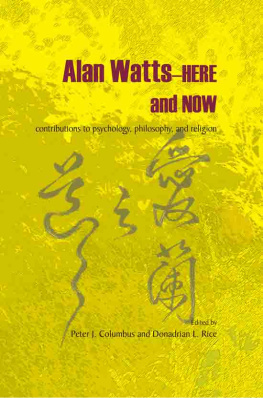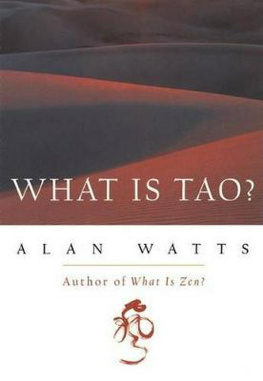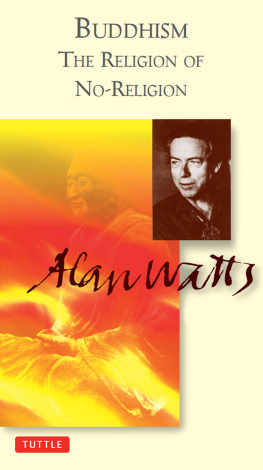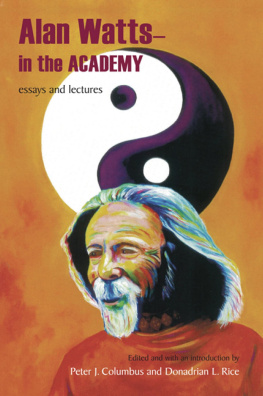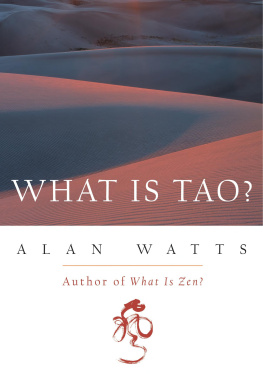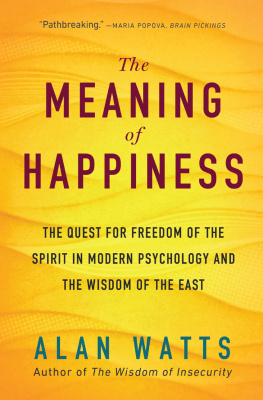


| New World Library 14 Pamaron Way Novato, California 94949 |
Copyright 1989 by Anne Watts and Joan Watts
Originally published by Pantheon Books in 1961
All rights reserved. This book may not be reproduced in whole or in part, stored in a retrieval system, or transmitted in any form or by any means electronic, mechanical, or other without written permission from the publisher, except by a reviewer, who may quote brief passages in a review.
Text design by Tona Pearce Myers
Library of Congress Cataloging-in-Publication Data
Names: Watts, Alan, 1915-1973, author.
Title: Psychotherapy, East and West / Alan Watts.
Description: Novato, CA : New World Library, 2017. | Previously published: New York : Vintage Books, 1975. | Includes bibliographical references.
Identifiers: LCCN 2016048194 | ISBN 9781608684564 (alk. paper) | ISBN 9781608684571 (e-book : alk. paper)
Subjects: LCSH: Psychotherapy. | East and West. | Large type books.
Classification: LCC RC480.5 .W33 2017 | DDC 616.89/14--dc23
LC record available at https://lccn.loc.gov/2016048194
First New World Library printing, February 2017
ISBN 978-1-60868-456-4
Ebook ISBN 978-1-60868-457-1
Printed in Canada on 100% postconsumer-waste recycled paper

| New World Library is proud to be a Gold Certified Environmentally Responsible Publisher. Publisher certification awarded by Green Press Initiative. www.greenpressinitiative.org |
10 9 8 7 6 5 4 3 2 1
For Jano
CONTENTS
T he subject of this book has been in the air for at least thirty years, and during this time there has been an ever-growing discussion of this or that parallel between Western psychotherapy and Eastern philosophy. But thus far no one has attempted, comprehensively, to find some basic design common to the methods and objectives of psychotherapy, on the one hand, and the disciplines of Buddhism, Vedanta, Yoga, and Taoism, on the other. The latter are not, perhaps, psychotherapies in the strict sense, but there is enough resemblance to make the comparison important.
The discussion seems to have begun in the early 1930s, following such works as Richard Wilhelms translation of a Chinese text, The Secret of the Golden Flower, with a long psychological commentary by C. G. Jung (1929), G. R. Heyers Der Organismus der Seele (1932), and Geraldine Costers Yoga and Western Psychology (1934). I have been deeply interested in this fruitful interchange between East and West almost from its beginnings. I also made some contribution to it in a rather immature book called The Legacy of Asia and Western Man (1937), and a little later in The Meaning of Happiness (1940), which bore the subtitle The Quest for Freedom of the Spirit in Modern Psychology and in the Wisdom of the East. At that time, almost the only form of psychotherapy which was thus oriented was the Jungian. But subsequent developments both in psychotherapy and in our knowledge of Eastern thought have made it possible for us to make much wider and more suggestive comparisons. The same period has also seen an astonishing growth of Western interest in Eastern ways of life, particularly in Zen Buddhism, and the latest contribution to this interchange is the collaboration of Erich Fromm and D. T. Suzuki in Zen Buddhism and Psychoanalysis (1960).
My purpose in writing this book is not, however, to sum up or review the development of this discussion. It is rather to give it a new turn. Before the writing began, I saw that there were two main ways of handling the subject. Since I have read almost everything that has been written about it, I saw that I could weave all this material into a kind of critical history of psychiatric interest in Eastern thought, combined with a point-by-point comparison of all the major forms of psychotherapy and all the principal techniques of the Eastern disciplines. But this would have produced an unwieldy volume of rather academic interest; furthermore, such formal studies are not my forte, and I leave them very gladly to those who have the necessary patience and industry. The other way was to describe what I feel to be the most fruitful way in which Eastern and Western psychotherapies can fertilize one another. For not only have they much to learn from each other, but also it seems to me that the comparison brings out hidden and highly important aspects of both. I decided, therefore, to write not a compendium of sober conclusions, but a provocative essay which may jolt both parties to the discussion. For I feel that both are fumbling in the dark, though not without some light. Wonderful as I have found them, I do not believe that the Eastern disciplines are the last word in sacrosanct and immemorial wisdom such that the world must come and sit humbly at the feet of their masters. Nor do I feel that there is a gospel according to Freud, or to Jung, in which the great psychological truths are forever fixed. The aim of this book is not to say the last word on the subject, but to provoke thought and experiment.
My chosen approach to the subject does, however, have the disadvantage of not being able to give adequate mention to all the people who have influenced my thinking, or sufficient recognition to all who have contributed to the discussion. Conversations that were held and books that were read long ago become so much a part of the stream of ones own thinking that it is impossible, sometimes, to say which ideas are ones own and which are borrowed. This book does not therefore make explicit what may have come from my early reading of such speculative and adventurous therapists as Trigant Burrow, Georg Groddeck, and my friend Eric Graham Howe. It does not specify what I have gained over the years from discussion of its main theme with Professor Frederic Spiegelberg, of Stanford University, or with Dr. Lillian Baker and the late Dr. Charles G. Taylor, both Jungian analysts. Nor does it acknowledge the contributions which have been made to the subject by Medard Boss, Hubert Benoit, Henry Dicks, and Lili Abegg, in Europe; by Shoma Morita, Takehisa Kora, and Akihisa Kondo, in Japan; or by Karen Horney, Harold Kellman, Joseph Campbell, Margaret Rioch, and many others, in the United States.
But the reader will quickly recognize, in the books underlying philosophy of the universe as organic and transactional, my debt to A. N. Whitehead, Joseph Needham, L. L. Whyte, A. F. Bentley, and the Gestalt psychologists. If he has read my other books, he will also see the more recent influence of what I must call, to distinguish them from the neo-Freudians like Horney and Fromm, the meta-Freudians Norman O. Brown and Herbert Marcuse. He will also note my increasing respect for the communication psychology of Gregory Bateson and his associates, particularly Jay Haley, which goes hand in hand with my growing preference for discussing these matters in a language that is more scientific and less metaphysical.
He will find, therefore, that I place more weight upon the connection of the Eastern disciplines with forms of psychotherapy whose philosophy is social, interpersonal, and communicational than with those which stress the unconscious and its archetypal images. Even though the discussion of this interchange between East and West has so largely been carried on by those who follow the latter trend, I cannot help feeling that it is becoming more and more of a backwater in the development of Western psychiatry, despite the debt which we shall always owe to Freud. Psychoanalysis in particular and depth psychology in general seem to me to be increasingly out of touch with all that has been going on in the sciences of human behavior during the last thirty years, and many of us are wondering seriously how long it will be possible for psychology, the study of an alleged psyche, to remain a department of science.
Next page
